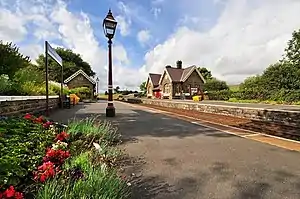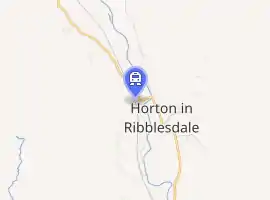Horton-in-Ribblesdale railway station
Horton-in-Ribblesdale railway station is a small station that serves the village of Horton in Ribblesdale, North Yorkshire, England on the Settle–Carlisle Line 47 1⁄4 miles (76 km) north-west of Leeds. The station is owned by Network Rail and is operated by Northern who provide all passenger train services.
 | |
| Location | Horton-in-Ribblesdale, Craven England |
| Coordinates | 54°08′57″N 2°18′07″W |
| Grid reference | SD803726 |
| Owned by | Network Rail |
| Managed by | Northern Trains |
| Platforms | 2 |
| Tracks | 2 |
| Other information | |
| Station code | HIR |
| Classification | DfT category F2 |
| History | |
| Original company | Midland Railway |
| Pre-grouping | Midland Railway |
| Post-grouping | |
| Key dates | |
| 1 May 1876 | Opened as Horton |
| 26 September 1927 | Renamed Horton-in-Ribblesdale |
| 4 May 1970 | Closed |
| 16 July 1986 | Reopened |
| Passengers | |
| 2015/16 | |
| 2016/17 | |
| 2017/18 | |
| 2018/19 | |
| 2019/20 | |
| Location | |

| |
| Notes | |
Passenger statistics from the Office of Rail and Road | |
History
The station was completed by the Midland Railway in 1876 and was opened for passengers on 1 May. It was initially named "Horton".[1] The London Midland and Scottish Railway absorbed the Midland Railway on 1 January 1923 and renamed the station as Horton-in-Ribblesdale on 26 September 1927.[2]
The station buildings were designed by the Midland Railway company architect John Holloway Sanders.[3]
The station is currently (2019) served and managed by Northern, as are all the trains calling at the station. It is unstaffed, with no ticket vending facilities (so tickets can only be purchased in advance or on the train - Northern has stated it plans to provide a ticket machine here in the future). The station waiting room is open for public use, having been restored by the Settle & Carlisle Railway Trust in 2002 as part of a wider refurbishment of the main buildings on the eastern side (other parts of the building are rented out for commercial use).[4]
It is located near to Pen-y-ghent, one of the mountains known collectively as the Yorkshire Three Peaks. The station and the village of Horton-in-Ribblesdale are at 850 feet above sea level, as stated on the decorative station information board, and are about 6 miles (10 km) north of Settle.
In the 1950s and 1960s under stationmaster Taylor, Horton won the "Best Kept Station" award for 17 consecutive years.[5] The station lost its passenger service on 4 May 1970, but reopened in July 1986,[6] along with several other local stations on the line under British Rail. Goods traffic was handled at the station until 1964, with sidings at the southern end serving the nearby Horton Quarry continuing in use until the early 1980s. These were removed after the station signal box was decommissioned in 1986, but plans to reinstate them (as was done at nearby Arcow Quarry in 2016) are currently under consideration.
Facilities
As the station does not have a footbridge, the platforms are linked by a foot crossing (known in railway terms as a barrow crossing).[7] Both platforms are lower than standard (though the southbound one has been partially raised to improve access to trains); there is no step-free access.[8] Train running information is available via telephone and timetable posters, with digital PIS displays also now available following a rolling upgrade programme of station facilities by operator Northern.
The station is also to receive a new footbridge in the coming year (as announced in March 2020), thanks to a £1.9 million scheme funded jointly by Network Rail and the government. This will see a fully accessible footbridge (complete with lifts) installed to replace the current barrow crossing.[9] The bridge will also allow a scheme to relay the former quarry sidings (to permit Horton quarry to dispatch its stone by rail once more) to proceed.[10]
Service
Route 7: Bentham Line and Settle & Carlisle Line |
|---|
There are about one train every two hours in each direction: southbound to Leeds (seven in total) and northbound to Carlisle (eight, plus one evening train that terminates at Ribblehead). The total is slightly unbalanced as some trains do not stop here. There is an extra train to Leeds on Saturdays, whilst there are five trains a day to both Leeds and Carlisle on Sundays (one of the former now continues to Nottingham).[11]
Bibliography
- Butt, R. V. J. (1995). The Directory of Railway Stations: details every public and private passenger station, halt, platform and stopping place, past and present (1st ed.). Sparkford: Patrick Stephens Ltd. ISBN 978-1-85260-508-7. OCLC 60251199.
References
- Butt, p. 123
- Butt, p. 123
- "Notes by the Way". Derbyshire Times and Chesterfield Herald. 1 November 1884. Retrieved 12 July 2016 – via British Newspaper Archive.
- "Horton-in-Ribblesdale". Settle-Carlisle Railway. Retrieved 17 May 2019.
- Law, Kevin (2003–2006). "Helwith Bridge to Horton in Ribblesdale". The Settle & Carlisle Railway. Archived from the original on 17 August 2007. Retrieved 3 September 2007.
- "Settle - Carlisle Line Key Events". Archived from the original on 11 May 2008. Retrieved 27 August 2008.
- "SCRCA structure 242490: Horton-in-Ribblesdale Station - Barrow Crossing & PROW (footpath) | SCRCA". scrca.foscl.org.uk. Retrieved 19 December 2018.
- Horton-in-Ribblesdale Station Information Northern station page; Retrieved 25 November 2016
- "Horton Station to get £1.9m bridge" Mason, V Telegraph & Argus news article, 12 March 2020; Retrieved 22 April 2020
- Johnston, Howard (12 August 2020). "Regional News - Horton-in-Ribblesdale". Rail Magazine. No. 911. Peterborough: Bauer Media. p. 22. ISSN 0953-4563.
- GB National Rail Timetable May 2019; Table 42
External links
 Media related to Horton-in-Ribblesdale railway station at Wikimedia Commons
Media related to Horton-in-Ribblesdale railway station at Wikimedia Commons- Train times and station information for Horton-in-Ribblesdale railway station from National Rail
| Preceding station | Following station | |||
|---|---|---|---|---|
| Settle | Northern Trains Settle and Carlisle Line |
Ribblehead | ||